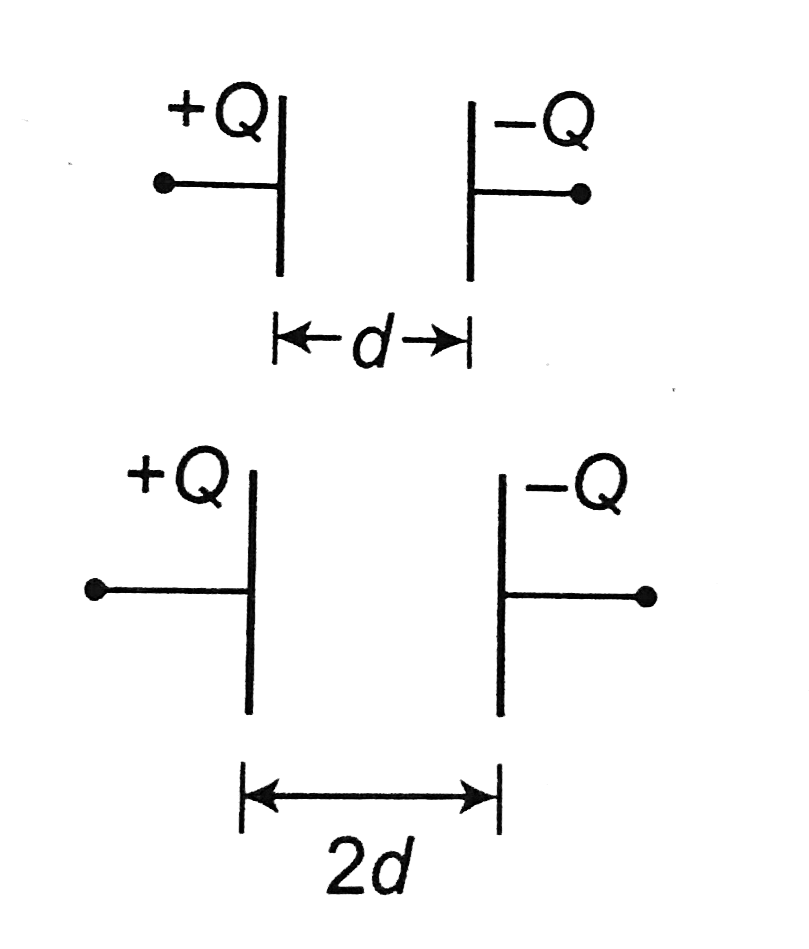A parallel plate capcitor has plate area and separation . It is charged to a potential difference . The charging battery is disconnected and the plates are pulled apart to three times the initial separation. The work required to separate the plates is
The correct Answer is:B
Topper's Solved these Questions
Similar Questions
A parallel plate capacitor has plate of area A and separationd .It is charged to a potential difference V0 . The charging battery is disconnected and the plates are pulled apart to three times the initial separation.The work required to separate the plates is.
View SolutionA parallel-plate capacitor has plates of area A and separation d and is charged to a potential difference V. The charging battery is then disconnected, and the plates are pulled apart until their separation is 2d. Derive expression in terms of A,d and V for
(a) the new potential difference
(b) the initial and final stored energies, Ui and Uf and
(c) the work required to increase the separation of plates from d to 2d.
View Solution
Knowledge Check
A pararllel plate capacitor has plates of area A and separation d and is charged to potential diference V. The charging battery is then disconnected and the plates are pulle apart until their separation is 2d. What is the work required to separate the plates?
A2ε0AV2/dBεAV2/dC3ε0AV2/2dDε0AV2/2dA parallel plate capacitor of plate are A and plate separation d is charged by a battery of voltage V. The battery is then disconnected. The work needed to pull the plates to a separation 2d is
AAv2ε0dB2Av2ε0dCAv2ε02dD3Av2ε02dA parallel plate capacitor has plates with area A and separation d. A battery charges the plates to a potential difference V0. The battery is then disconnected and a dielectric slab of thikness d is introduced. The ratio of the enrgy stored in the capacitor before and after the slab is introduced, is
AKB1KCAd2KDd2KA
A parallel plate capacitor having plate area A and separation between the plates d is charged to potential V.The energy stored in capacitor is ....???
View SolutionA parallel - plate capacitor of plate area Aand plate separation d is charged to a potential difference V and then the battery is disconnected . A slab of dielectric constant K is then inserted between the plate of the capacitor so as to fill the space between the plate .Find the work done on the system in the process of inserting the slab.
View SolutionA parallel plate capacitor each with plate area A and separation ‘d’ is charged to a potential difference V. The battery used to charge it is then disconnected. A dielectric slab of thickness d and dielectric constant K is now placed between the plates. What change if any, will take place in
(i) charge on the plates
(ii) electric field intensity between the plates,
(iii) capacitance of the capacitor
Justify your answer in each case
View SolutionA parallel plate capacitor of plate area A and plate separation d is charged to potential difference V and then the battery is disconnected. A slab of dielectric constant K is then inserted between the plates of the capacitor so as to fill the space between the plates. If Q, E and W denote respectively, the magnitude of charge on each plate, the electric field between the plates (after the slab is inserted), and work done on the system, in question, in the process of inserting the slab, then
View SolutionA parallel plate capacitor is charged. If the plates are pulled apart
View Solution

